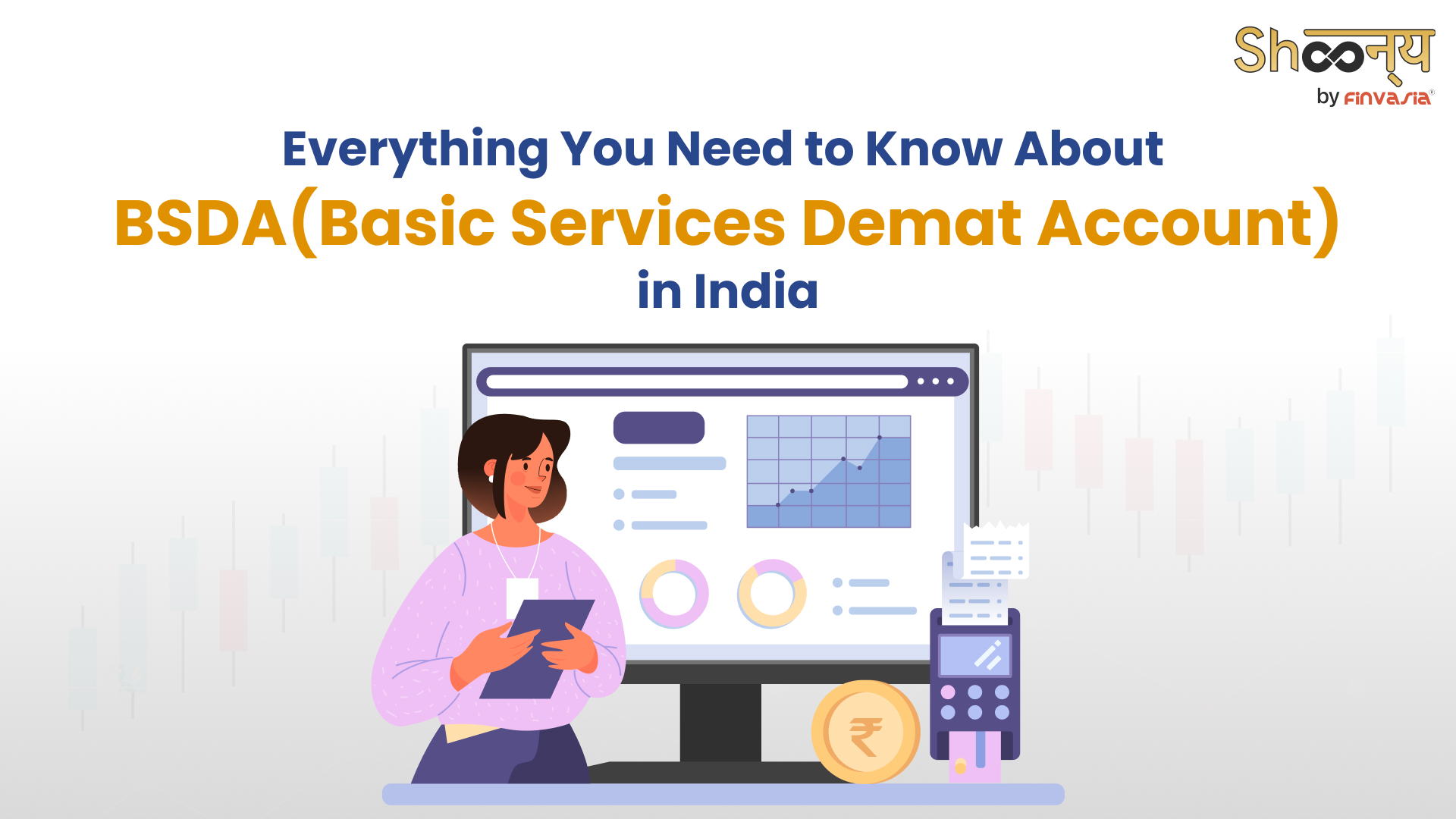BSDA Account| Basic Sevices Demat Account in India

A Basic Services Demat Account (BSDA) in India is designed for small investors who seek a low-cost option for holding securities. The BSDA account simplifies investment in stocks, mutual funds, bonds, ETFs, etc.. It is for those who may not invest frequently or hold large volumes of securities. It’s an initiative by SEBI to make the securities market more accessible to the average person.
Now, what are the features of the Basic Services Demat Account, and what is the eligibility?
Let us take a look!
Introduction to Demat Accounts
A demat account holds your shares and securities in electronic form. It makes it easier to trade and manage your investments in the Indian stock market.
Instead of dealing with physical certificates, a demat account allows you to buy, sell, and store your investments digitally.
Now comes the question: is the demat account suitable for all retail investors?
For small investors, demat account fees and charges can be huge.
To help with this, SEBI introduced the Basic Services Demat Account (BSDA). This is a special type of demat account with lower maintenance costs designed for individuals with a small portfolio.
SEBI’s Initiative for Cost-Effective Demat Accounts
It all began in 2012 when SEBI received several suggestions and representations regarding the cost of demat accounts, all of which focused on the idea of financial inclusion for small individual investors.
Recognizing the benefits of demat accounts for individual investors, SEBI introduced BSDA accounts.
It was decided that all depository participants (DPs) would offer a “Basic Services Demat Account” (BSDA) with limited services and reduced costs.
Now, how does this Basic Services Demat Account differ from a normal demat account.
Let us take a look!
Difference Between BSDA Account and Regular Demat Account
| Features | Basic Services Demat Account | Regular Demat Account |
| Eligibility | Individuals with securities value up to ₹2,00,000 | No restriction on securities value |
| Annual Maintenance Fees | NIL for holdings up to ₹50,000 | Depends upon the broker or online platform. Some may even offer zero AMC. |
| Transaction Statements | Sent quarterly if transactions occur | Sent regularly, regardless of transactions |
Eligibility to Open a BSDA Account in India
RBI has shared certain eligibility guidelines:
- You must have or plan to have only one demat account where you are the sole or first holder.
- The total value of securities in the demat account should not exceed ₹2,00,000 at any time.
- You can have only one Basic Services Demat Account in your name across all depositories.
Features of BSDA Account in India
BSDA full form is Basic Services Demat Account.
The salient features of the BSDA account are as follows:
Transaction Statements
Transaction statements will be sent to the Beneficial Owner (BO) at the end of each quarter. If there are no transactions in a quarter, no statement will be sent for that period.
Holding Statement
As per RBI, BO shall receive an annual physical holding statement for accounts with no transactions and nil balance.
For other accounts, one annual holding statement will be sent in the format (electronic or physical) chosen by the BO.
Additionaly, one annual holding statement in the format (electronic or physical) chosen by the Beneficial Owner (BO) for other accounts.
Charges for Statements
Electronic statements must be free of charge. The DP will provide at least two physical statements free of charge during the billing cycle.
Additional physical statements may incur a fee of up to ₹25 per statement.
Charges for a BSDA Account in India
Here is the detail of the charges and fees applicable to Basic Services Demat Accounts in India:
- No annual maintenance charges (AMC) for holdings up to ₹50,000.
- AMC up to ₹100 for holdings between ₹50,001 and ₹2,00,000.
Depository Participants (DPs) determine the value of holdings based on the daily closing price or NAV of the securities or mutual funds.
If your holdings exceed ₹2,00,000, the DPs may apply regular account charges from that date onwards.
Open a lifetime free demat account with zero annual charges!
How Can You Open a BSDA Account in India?
You can open a Basic Services Demat Account in India with any depository participant (DP) authorized by SEBI.
- Please ensure that you have only one demat account where you’re the sole or first holder.
- You must confirm that the value of securities in the account doesn’t exceed ₹2,00,000.
- You can contact any registered depository participant (DP) to open your BSDA account.
- Provide necessary documents like ID proof, address proof, and PAN card.
- Once your account is open, you can enjoy reduced maintenance charges and services.
What Are the Benefits of a BSDA Account?
The perks of a Basic Services Demat Account include lower maintenance charges, especially if your holdings are under ₹50,000.
It’s great for small investors because it gives them access to electronic securities management at a lower cost.
Plus, there are usually no charges for converting physical documents to electronic ones.
Conclusion
BSDA (Basic Services Demat Account) offers a cost-effective way for small investors to engage in the stock market. The BSDA account is indeed a great step by RBI to promote financial inclusion and empower individuals to participate in India’s growing stock market.
Source- rbi.org.in, sebi.gov.in
FAQs| Basic Services Demat Account
Yes, one can have Term/Fixed Deposit, Recurring Deposit, etc., accounts in the same bank where they have a ‘Basic Savings Bank Deposit Account’.
No, individuals are allowed to have only one ‘Basic Savings Bank Deposit Account’ in a single bank.
Free services include deposit and withdrawal of cash, receiving/crediting money through electronic payment channels, and depositing/collecting cheques at bank branches and ATMs.
RSDA stands for Regular Service Demat Account, while BSDA is a Basic Services Demat Account with limited services aimed at small investors.
______________________________________________________________________________________
Disclaimer: Investments in the securities market are subject to market risks; read all the related documents carefully before investing.








